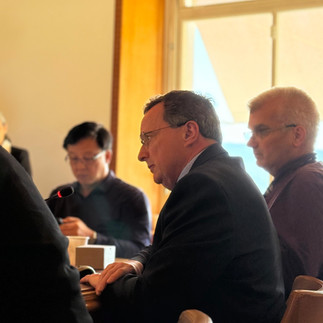Scotland’s Right to Self-Determination under International Law
- Sep 20, 2025
- 4 min read
Updated: Sep 22, 2025

Venue: United Nations Office at Geneva (Room S4, S Building, S2 entrance)
On 18 September 2025, Justice pour Tous Internationale (JPTi), in collaboration with the International Probono Legal Services Association (IPLSA), hosted a landmark event at the United Nations Office in Geneva examining Scotland’s right to self-determination under international law. The session was moderated by Jun Ho, Chief Administrator and Research Officer of IPLSA.
Drawing on legal, historical, and human rights perspectives, the event highlighted Scotland’s claim that it was not incorporated into a unitary Kingdom of Great Britain in 1707, but instead was absorbed into a continuing English state, rendering it a Crown dependency rather than a voluntary partner. With no constitutional protection for devolved powers, Scotland today lacks a permanent path to self-government, and its case for recognition as a Non-Self-Governing Territory (NSGT) under UN resolutions has been formally placed before the international community.
Key Discussions
Speakers presented evidence of the coercive nature of the 1707 Treaty of Union, Scotland’s continuing lack of constitutional guarantees, and the structural dependency imposed through Westminster’s control of fiscal policy, foreign affairs, and natural resources. Participants examined Scotland’s current opaque constitutional status and the ban imposed by the UK Supreme Court on holding a referendum on self-determination, in light of international law and UN decolonisation resolutions. They stressed that Scotland’s devolved institutions remain revocable under UK law, that fiscal and natural resource extraction undermines genuine self-government, and that the United Kingdom’s failure to ratify the Optional Protocols to the ICCPR and ICESCR leaves Scots without access to international remedies for violations of their economic, social, cultural, civil, and political rights.
Sara Salyers (Director, Salvo) highlighted the central legal argument underpinning Scotland’s claim:
“It is vital to emphasise that the absence of any voluntary partnership or partnership agreement directly contradicts the sole evidence advanced by the United Kingdom in claiming that Scotland is not a dependency or colony. On the contrary, this absence provides clear legal proof of Scotland’s dependency, reinforcing its case under international law.”
This argument, also advanced by Professor Robert Black KC and Ailsa Gray, is central to Scotland’s forthcoming full-fledged petition to the Secretary-General, the Fourth Committee of the UN General Assembly, and its Special Committee on Decolonization (C-24). It is precisely this absence of a voluntary foundation that distinguishes Scotland’s case from that of many other nations deserving recognition as Non-Self-Governing Territories (NSGTs), giving Scotland a unique and compelling legal standing within the UN decolonisation framework.
Craig Murray (former UK Ambassador and human rights defender) highlighted the global security implications of independence:
“Scotland’s independence carries profound implications for global security. The major component of the United Kingdom’s nuclear arsenal—the Trident fleet—is based in Scotland. Just as the nuclear weapons stationed in Ukraine were dismantled under United Nations supervision following the dissolution of the Soviet Union, so too could the independence of Scotland open the way for the removal and dismantling of these weapons. Such a process would lead to a very substantial reduction in the United Kingdom’s nuclear capability. This demonstrates that Scotland’s right to self-determination is not only a matter of decolonisation but also a decisive contribution to the global agenda of denuclearization, disarmament, and peace.”
This intervention reinforced the linkage between Scotland’s petition and the broader UN objectives of peace and security.
Comparative Cases
The event also examined comparative experiences from other regions where sovereignty and self-determination remain unresolved. Speakers referenced India (Singh’s intervention), Kosovo, and Sri Lanka in relation to the Tamil people, noting parallels in the denial of self-determination. The Bonaire Movement was cited as a significant case, drawing attention to the Caribbean islands, where not only the United Kingdom and the United States, but also the Netherlands, continue to administer and exploit Non-Self-Governing Territories and their peoples.
These examples underscore the continuing relevance of the UN decolonisation framework and the urgent need for its consistent and coordinated application. Participants emphasised the importance of building bridges and synergies between the UN Fourth Committee and the Special Committee on Decolonization (C-24) in New York, and the Human Rights Council and its Special Procedures mandate holders in Geneva. Such coordination is essential to enable actionable remedies for peoples facing domination, exploitation of their resources, and erosion of their rights.
Media Coverage
The event attracted broad media attention. The BBC documented the proceedings and conducted interviews with JPTi’s Executive Director and participants, reflecting the growing international relevance of Scotland’s petition. At the same time, Scottish media, including The National, were present, ensuring that the case resonates directly with the Scottish public and links international advocacy with domestic debate. This combination of international and national coverage underscored the significance of the event both at home and abroad.
Outcomes
The event concluded with a diplomatic dialogue engaging UN experts, civil society, and legal scholars on pathways for Scotland’s recognition within the UN system.
Sharof Azizov, Executive Director of JPTi, underlined:
“The right of peoples to self-determination lies at the heart of the UN Charter, and Scotland’s status must now be reviewed through this lens of justice and international law.”
Justice pour Tous Internationale (JPTi) will continue its legal and diplomatic work with Liberation Scotland and other partners to advance Scotland’s petition before the UN Fourth Committee, the Special Committee on Decolonization (C-24), and the UN Human Rights Council.
As the international community approaches the 80th anniversary of the United Nations (UN80), JPTi emphasises that this must be an essential focus of reforms: to revitalise and empower the UN’s decolonisation machinery, ensure coherence across its organs, and provide meaningful, enforceable pathways for peoples—including the Scottish people—to exercise their right to self-determination and reclaim control over their futures.
Programme Highlights
Opening Remarks
Junius Ho – Founder & CEO, IPLSA
Sharof Azizov – Executive Director, JPTi
Speakers
Prof. Robert Black KC – Emeritus Professor of Scots Law, University of Edinburgh
Ailsa Gray – Scottish lawyer, specialist in corporate governance
Prof. Alf Baird – Co-Convenor, Liberation Scotland
David Henry – Director, Scottish Sovereignty Research Group (SSRG)
Sara Salyers – Director, Salvo
Craig Murray – Former UK Ambassador, journalist, human rights defender
Alex Thorburn – Human rights defender
Prof. Mark McNaught – Founder, Scottish Sovereignty Research Group (SSRG)
Mr. George Katrougalos – UN Independent Expert on the Promotion of a Democratic and Equitable International Order
#JPTi #IPLSA #UNGeneva #UN80 #Decolonization #SelfDetermination #HumanRights #Scotland #ScottishIndependence #RightToSelfDetermination #NonSelfGoverningTerritory #NSGT #ScotlandAtTheUN #InternationalLaw #Decolonisation #UNFourthCommittee #C24 #PeoplesRights #DemocraticOrder #GlobalJustice #Denuclearization #Disarmament #Peace #BBC #TheNational #HRC #UNOG #OHCHR
























































